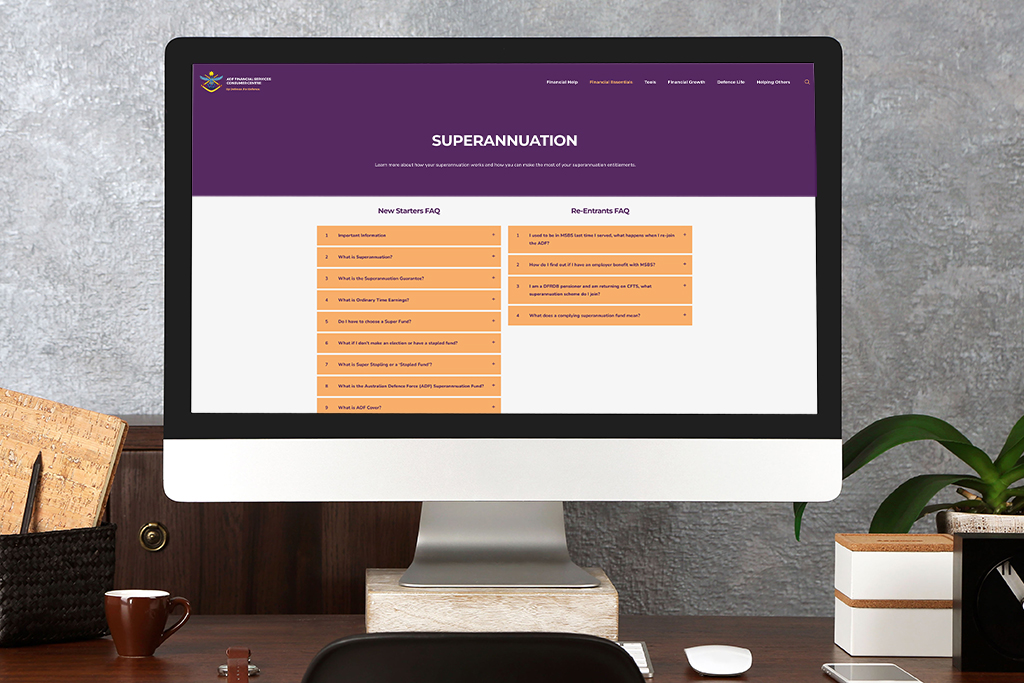
UNDERSTANDING SUPERANNUATION – our new FAQs
November 13, 2023
AI AND FINANCIAL ADVICE – A POSTSCRIPT
November 13, 2023Service in the ADF comes with many important responsibilities. The principal one must always be to defend Australia and its national interests. That’s a “given” for every member.
While acknowledging that principal responsibility, ADF service also offers a wide and varied range of interesting and fulfilling career paths. However, what’s often overlooked by our members is the opportunity that ADF service offers to build personal and family financial independence. This is an opportunity that is rarely replicated elsewhere.
This point was powerfully illustrated by a young ADF member at a recent financial education seminar presented by our Centre. One of the participants disclosed that he had attended a pre-deployment financial brief some five years ago in which the educator had urged participants to get their financial houses in order by committing to some achievable financial goals and then using the Budget Calculator on the Centre’s website to achieve them.
The member took this challenge seriously and acted accordingly. He is now the proud owner of a share portfolio and an investment property which he readily admits he would not have, other than for the sensible actions he took a few short years ago.
To achieve this result, the member needed to borrow money to buy the property. Not that we’re necessarily promoting the idea of borrowing money, but doing so is the only realistic option for most aspiring property investors. Nevertheless, it must be recognised that borrowing money involves risk at a number of levels, including interest rate rises, market volatility and a lack of job security, all of which may impact upon a borrower’s ability to repay the loan.
In an ADF context, it’s the last one, job security, which provided a significant advantage to this member when it came to borrowing money. As a permanent member, he was able to demonstrate to potential lenders that he received a regular fortnightly income. And most importantly, he was able to convince lenders that he presented a low risk of default because, as a permanent member of the ADF, he had excellent job security.
Members should not underestimate the power of this point. These days, lenders are extremely sensitive about being seen to lend responsibly and to do so with people who have good prospects of being able to repay their debts. Contrast this with “gig economy” workers (e.g., many hospitality workers) and even many self-employed tradies whose ability to source loans is severely limited by the variable and insecure nature of their work.
The young man referred to in this article transformed his life due to his willingness to create financial goals and implement strategies to achieve them. He has done all of this in the context of permanent ADF employment which he sensibly recognised provides the favourable employment environment in which to achieve his goals.
Similarly, positive results can be achieved through the maximisation of superannuation contributions (e.g., by salary sacrifice) or renovating a house or by carefully investing in shares (or all of the above). We’re not telling people how to invest. That’s up to each person, based on their unique set of circumstances.
All we’re doing is asking ADF members, especially younger ones, to recognise the opportunity that your service offers, to exercise some personal discipline by setting some realistic financial goals and implementing a plan to realise them.
Of course, you may wish to seek professional financial advice before putting these arrangements in place. If so, we suggest reviewing the financial advice section on our website.
Last but not least, the Centre has some useful calculators and tools on our website, namely the Employment Package Estimator and SERCAT Change Estimator. These have been designed for members to understand the true value of their ADF employment package (often underestimated) and to enable members to consider their financial and employment options in a disciplined and factual way to avoid making poorly informed decisions they may later regret.








